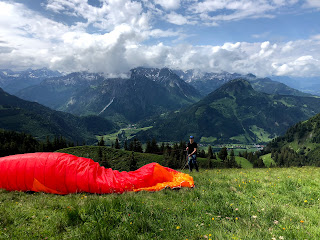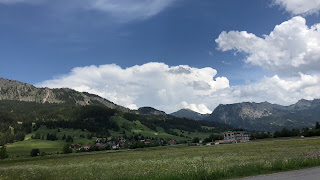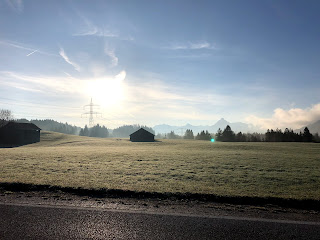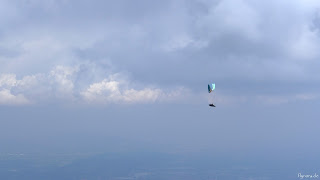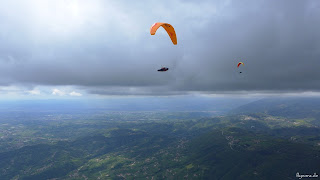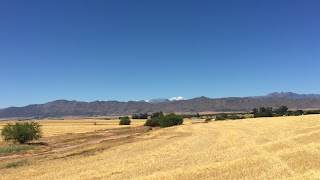Updated on 14.05.2018
Long was I roaming around on the search for a new wing that would carry me through good times and through even better times.... My search began last year in September, when I realized, my LM6 would need a replacement sooner or later after we went through many nice flights together.
I was on some dates with a Zeno or lets rather call it appointments since I didn't feel that romantic spark. The Zeno without any doubt is a wonderful wing, with a great performance and for many many pilots, probably THE wing, but somehow not for me. It was nice and gentile, sporty, beautiful, elegant..., but we somehow didn't fully connect. There was always a small doubt in my stomach. And so I decided to stay with my LM6 for some time longer.
Until at the
BaWü Open somebody said to me: "why don't you try the UP Meru? I promise, you'll love it." And I thought, ok, why not. It can't do any harm to get to know each other and arrange some get together.
I asked for a tester and two weeks later received it, a day before the
Mosel Open 2018.
As with every new wing, I was a bit nervous before the first flight. Especially since it was in a competition, with a lot of wind, on a new takeoff... not the ideal thing, normally.
I decided to take off late, to don't be stressed too much if I would struggle in taking off. Since the type of task was a race to goal with multiple start gates, I wouldn't lose too much time through that. The only disadvantage would be to maybe have to fly on my own or at lead with slower pilots, I thought.
 |
| Picture by Joel Debons |
The take-off:
The take-off was quite a mess to be honest. The wing went here and there, but not really above my head where it should go. I was so late, that the last start gate was opening within 5 minutes. And not relaxed at all. After several attempts, I finally maded it in the air.
My learning: The Meru has no shooting tendencies at all during start, which, compared to the LM6 - a wing that almost starts on its own - makes it slightly more inert, when lifting it up. The Meru wants really to be guided above your head but therefore doesn't lever you out. When reverse launched, it want's to be only lifted with the most inner A-line (not the whole riser). Once I figured that out, it was quite easy.
The flight:
After I was finally in the air, I went right from takeoff, into a thermal and minutes later I was above take-off and soon approaching top of lift. When I left towards the first turn point 10 minutes after the start gate, it was the first time that thought "cool, I'm under a new wing!". It was so intuitive, so easy to handly, so much fun to circle, so much "me and the wing as one piece" that a barely realized that this was something new. It felt like we were flying together since years, like we understood each other without any doubt. The flight went on like this, with strong winds, strong thermals, some tough parts that required a lot of patience in weak climbs... and throughout all that flight, I felt completetly, safey, secure, happy, one with the wing. I reached goal on that day as the first woman and 22nd overall and with a big smile in my fest. My best ever result. I can't say much about the performance in direct comparison to Zenos, Enzos or Booms, since I for long parts of that flight was on my own. On the next day, we had some close flying together and it seemed we were flying similar in terms of glide and speed.
Collapse:
On the second day, not long after the race started I could experience, how the Meru behaves, when things are not that smooth. The turnpoint was set in the middle of the lee of a hill and no matter how high you were, you have been washed down. When approaching that turn point, the Meru talked to me, loudly and determined. It collapsed for around 50%. But didn't even bother to turn. It was easy, manageable, trustworthy.
Landing:
Well, it glides... very well. So you'd like to have some space. Thanks to it's direct and intuitive handling, it's however quite easy to also get it landed on the spot.
What else?
Is there a down side? So far I couldn't find a lot.
Maybe, that it's only available in one color. The Meru is now available in two nice different color schemes (http://www.up-paragliders.com/en/news/item/634-meru-new-size-and-new-colour-option) and also in the making for heavier pilots up to 130kg.
For sure that it's only available in two sizes, which for me is not a big disadvantage, but for heavier or a lot lighter pilots it might be. Luckily it flies very well - also in turbulent conditions, also with strong head wind - in the middle of the weight range, which I'm exactly at on the MS size. I have the feeling, it doesn't have to be fully loaded and rather likes it a bit lighter.
The dyneema lines: Most lines of the Meru are made of Aramide, only the main lines are made of dyneema. Dyneema has a bad reputation, but also the Trango XRace uses this type of lines as main lines and so far I didn't hear any complaints. Probably UP found a way to solve the known issues. I'm pretty sure otherwise they wouldn't have used this configuration.
Am I going to fly it more?
I definitely will! For me the Meru has everything I was looking for as a wing: Intuitive handling, great ability to climb in both strong and weak conditions, great gliding performance, good handling on the B-risers, safe feeling, direct handling, great feedback. I know, I'm using a lot of superlatives :-) But that's how it is when you experience love on first flight!
I flew the Meru now also in heavy spring conditions with strong winds and lee side thermals in Greifenburg, Kärnten during the Hessen Meisterschaft. It gives a lot of feedback in these conditions but not in an aggravating kind of way. It wants to be flown, but is honest in its reactions. I'm still excited!



